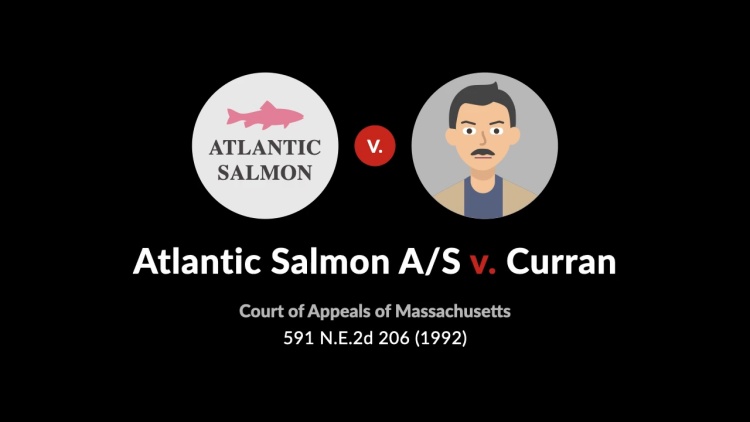Atlantic Salmon A/S v. Curran
Appeals Court of Massachusetts
32 Mass.App.Ct. 488, 591 N.E.2d 206 (1992)
- Written by Ronald Quirk, JD
Facts
Curran (defendant) purchased salmon for resale from Salmonor A/S (Salmonor) and Atlantic Salmon A/S (Atlantic) (plaintiffs) from 1985 to 1988.When making his purchases, Curran held himself out as representing one of two companies, Boston International Seafood Exchange, Inc. or Boston Seafood Exchange, Inc., neither of which actually existed. In 1983, a company owned by Curran—Marketing Designs, Inc. (MDI)—was legally dissolved. But, in 1987, Curran filed a certificate with the Boston City Clerk, stating that MDI was conducting business under the name of Boston Seafood Exchange. Curran did not disclose MDI’s existence to Salmonor or Atlantic. In 1988, Curran bought more than $250,000 worth of salmon from Salmonor and Atlantic with checks imprinted with “Boston International Seafood Exchange, Inc.” The checks were not honored, and Salmonor and Atlantic sued Curran to recover the amounts of the dishonored payments. At trial, Curran argued that he was not liable for the debt, because he was acting on behalf of MDI when he bought the subject salmon. Curran also contended that it did not matter that Salmonor and Atlantic thought they were dealing with companies that turned out to be fictitious, because they were “aware” that they were doing business with some kind of corporate entity, and not Curran as an individual. The trial court agreed with Curran, holding that he was not liable for the debt.
Rule of Law
Issue
Holding and Reasoning (Warner, C. J.)
What to do next…
Here's why 907,000 law students have relied on our case briefs:
- Written by law professors and practitioners, not other law students. 47,100 briefs, keyed to 996 casebooks. Top-notch customer support.
- The right amount of information, includes the facts, issues, rule of law, holding and reasoning, and any concurrences and dissents.
- Access in your classes, works on your mobile and tablet. Massive library of related video lessons and high quality multiple-choice questions.
- Easy to use, uniform format for every case brief. Written in plain English, not in legalese. Our briefs summarize and simplify; they don’t just repeat the court’s language.





